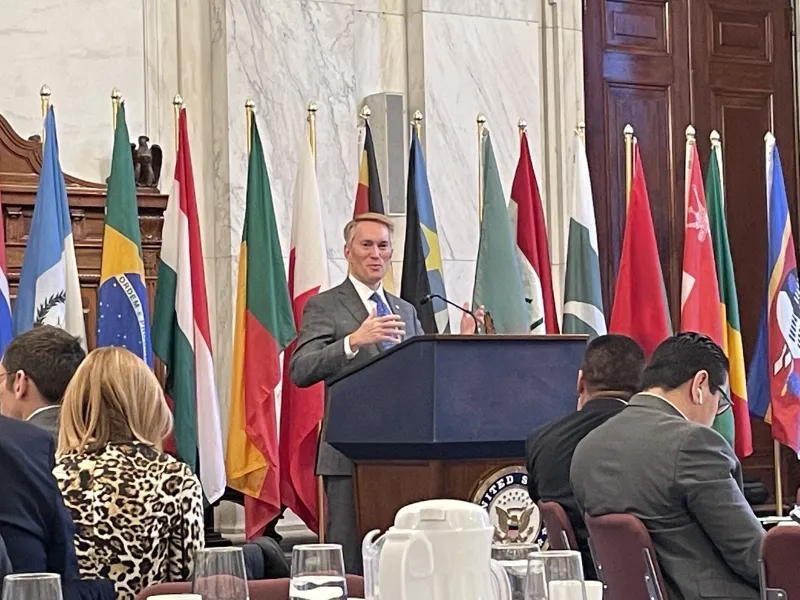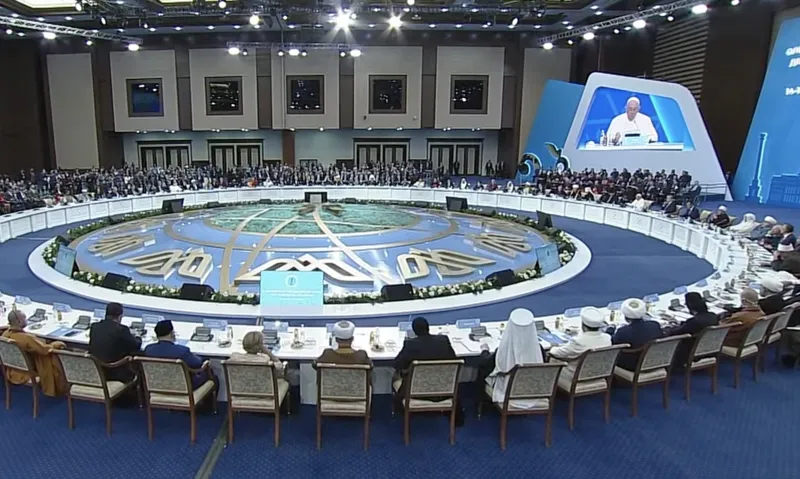 Senator James Lankford (R-Oklahoma) speaks against the Women’s Health Protection Act on the Senate floor, Feb. 28, 2022. / Screenshot/U.S. Senate
Senator James Lankford (R-Oklahoma) speaks against the Women’s Health Protection Act on the Senate floor, Feb. 28, 2022. / Screenshot/U.S. Senate
Washington D.C., Feb 28, 2022 / 17:05 pm (CNA).
The U.S. Senate failed to move forward with the Women’s Health Protection Act (WHPA) on Monday, striking down what some pro-life groups identify as the most radical abortion bill in U.S. history.
The WHPA “would enshrine into federal law abortion on demand until the moment of birth, and it would nullify state laws — new and existing – that protect unborn children and their mothers,” Jeanne Mancini, president of the March for Life, warned ahead of the vote.
The Feb. 28 cloture vote, with 46 for and 48 against the WHPA, needed 60 votes to proceed. It fell largely along party lines with only one Democrat (Sen. Joe Manchin of West Virginia) voting against proceeding with the bill that would override states’ pro-life laws and remove restrictions on abortion up to the point of birth in some cases. No Republicans voted in support of the WHPA.
Why is the Senate voting on the WHPA now?
While the act did not pass, the vote itself was historic.
Ahead of the vote on Monday, Senate Majority Leader Chuck Schumer (D-NY) said on the Senate floor: “This will be the first time that the Senate takes a vote on a standalone bill to proactively codify Roe.”
The Senate’s vote comes as the Supreme Court prepares to issue a ruling later this year in Dobbs v. Jackson Women’s Health Organization, a case that threatens Roe v. Wade, which legalized abortion nationwide in 1973. The Dobbs case centers on the question of “Whether all pre-viability prohibitions on elective abortions are unconstitutional,” or whether states can ban abortion before a fetus can survive outside the womb, which the court previously determined to be 24 to 28 weeks into pregnancy.
If the Supreme Court does not uphold Roe when it decides Dobbs, abortion could be left up to individual states. The WHPA threatens these state laws.
“Sadly, it seems like the Supreme Court is posed to severely limit abortion rights in the coming months,” Schumer said Monday. “That’s why this bill is essential.”
During a press conference hosted by Senators Steve Daines, founder and chair of the Senate Pro-Life Caucus, and James Lankford, chair of the Values Action Team, Republican senators criticized the timing of the vote during the invasion of Ukraine and called the WHPA more extreme than Roe.
Daines recognized the WHPA as the “most extreme legislation on abortion ever considered in the history of this body.”
On the Senate floor, Lankford added that the WHPA is “not going to just codify Roe.”
“This is talking about stripping away every protection for every child in the womb from any state in the country.” Later, he added, “This bill is the one-minute-from-infanticide bill. It mandates abortion in every state up to the moment of birth.”
What is the WHPA?
The WHPA would prohibit abortion restrictions or bans “that are more burdensome than those restrictions imposed on medically comparable procedures, do not significantly advance reproductive health or the safety of abortion services, and make abortion services more difficult to access.”
The act’s text lists a series of specific restrictions it would do away with, on everything from limitations on telemedicine to restrictions around viability, which the act defines as the point when a fetus can survive outside the womb — determined by “the good-faith medical judgment of the treating health care provider.”
The WHPA would forbid any kind of limit on abortion before fetal viability, including “a prohibition or restriction on a particular abortion procedure.” After viability, the WHPA would outlaw limits on abortion “when, in the good-faith medical judgment of the treating health care provider, continuation of the pregnancy would pose a risk to the pregnant patient’s life or health.”
National pro-life groups, such as SBA List, have expressed concern over this section because the Supreme Court, in Doe v. Bolton, broadly defined what “may relate to health,” including “all factors — physical, emotional, psychological, familial, and the woman’s age — relevant to the wellbeing of the patient.”
SBA List previously warned that the WHPA would also “nullify pro-life laws in states across the country, including late-term abortion limits when unborn children can feel pain, waiting periods, informed consent laws, antidiscrimination laws, and more.”
Last September, the House passed the WHPA in a vote that fell along party lines, with one Democrat, Rep. Henry Cuellar of Texas, joining Republicans to vote against it. Along the way, the Biden administration repeatedly expressed support for the bill.
Pro-life leaders respond to the vote
Ahead of the vote, multiple pro-life leaders expressed concern over the WHPA and stressed that the act ignored the will of the people.
“The March for Life condemns this bill in the strongest possible terms,” Mancini said. “The misnamed Women’s Health Protection Act is the most radical abortion bill in United States history.”
She cited a Knights of Columbus/Marist Poll survey released in January that found that 71% of Americans, including 49% of Democrats, want to see abortion limited to – at most – the first three months of pregnancy.
Marjorie Dannenfelser, the president of the Susan B. Anthony List, also criticized the WHPA.
“Biden, Pelosi and Schumer’s ‘Abortion on Demand Until Birth Act’ would enshrine an unlimited abortion ‘right’ in federal law and block common ground pro-life laws around the country, including limits on late-term abortions when unborn babies feel pain, bans on lethal discrimination abortions, and many more,” she said. “[N]ational Democratic leaders’ support for abortion on demand without limits, at taxpayer expense, is grossly out of step with the will of the American people.”
As president and founder of Live Action, Lila Rose wanted that if the WHPA passed, it “would be the single most destructive piece of legislation enacted in the history of our nation.”
Like Mancini and Dannenfelser, she said, “The American people do not want this horrific bill aimed exclusively at ensuring the ongoing and expanded destruction of hundreds of thousands of helpless, innocent preborn children.”
“We must walk with families materially, emotionally, and spiritually to show them that they can choose life for their children,” she added. “The Women’s Health Protection Act does the exact opposite, radically expanding the killing of children through all nine months of pregnancy.”
Two senior fellows at The Catholic Association also reacted to the approaching vote.
“In pushing the Women’s Health Protection Act, the Democrats show that their pro-abortion extremism knows no bounds,” Ashley McGuire stressed. “The law, if passed, would override the will of the people in every state that has passed, through legislative means, commonsense protections for women and babies.”
Maureen Ferguson called the WHPA “the most extreme, undemocratic abortion bill ever introduced in Congress.”
“It would override every limit on abortion everywhere in the country, including limits on late-term abortion, parental consent laws, and conscience protections for doctors and nurses who do not wish to participate in abortions,” she said. “The Women’s Health Protection Act is Roe vs. Wade on steroids.”
[…]






Families are the backbone of Planet Earth, our common home. May each family be blessed with strength, courage, a happy present, and a bright future.
A beautiful prayer. God bless you.
Re title of this article – I guess this is what Phil Lawler was on about the other day in Catholic Culture. (Sorry, I can’t re-find the article). I see Bishop (Arch?) Schneider, usually no slouch, also has reservations.
Religious pluralism.
Then why bother with the Catholic Church and its specific claims to Revelation and the truth?
Ramjet above – exactly.
At the World’s Congress of Religions (August 25 through October 15, 1893), which was concurrent with the World’s Columbian Exposition in Chicago, some 120 or more major papers were delivered. Of the over 100 presenters, seven were Catholic. Of these, Cardinal Gibbons (in his seven pages of small print) delivered a fraternal, and also forthright, and even modern address, including this:
“The religion of Christ imparts to us not only a sublime conception of God, but also a rational idea of man and of his relations to his Creator [….] The Gospel of Christ, as propounded by the Catholic church, has brought not only light to the intellect, but comfort also to the heart. It has given us ‘that peace of God which surpasseth all understanding”–the peace which springs from the conscious possession of the truth [….]
“The Catholic Church has taught man the knowledge of God and of himself [see Gaudium et spes, n. 22]; she has brought comfort to his heart by instructing him to bear the ills of this life with Christian philosophy [e.g., the later corpus of St. John Paul II]; she has sanctified the marriage bond [yes?]; she has proclaimed the sanctity and inviolability of human life from the moment that the body is animated by the spark of life till it is extinguished [timely!]; she has founded asylums for the training of children of both sexes and for the support of the aged poor; she has established hospitals for the sick and homes for the redemption of fallen women [or now, pro-life centers]; she has exerted her influence toward the mitigation and abolition of human slavery [and today’s sex trafficking]; she has been unwavering friend of the sons of toil [Rerum Novarum, 1891]. These are some of the blessings which the Catholic church has conferred on society.”
If possibly not a fitting focus from a guest to the interreligious congress in Kazakhstan, then surely some clear and non-generic reference points of the Faith, for fledgling superdicastery of Evangelization instituted as part of the current curial reform.
1) 1893. Why can’t we hear this today? Oh, sorry. Too triumphalist.
2) I think I was mistaken in thinking I had read an article by Phil Lawler on this notion of religious pluralism as God’s (active) will. I’ll have to go with just Bishop Schneider.
Jesus is the only way to Heaven!
Repent of your sins and turn to him as your Lord and Savior! We live in the end times.